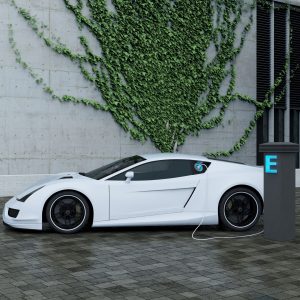This post originally appeared in Dassault Systèmes SIMULIA Blog and is authored by Clare Scott.
Quickly Develop and Test Electric and Autonomous Vehicles with Simulation
In the automotive market, one race is toward electrification of vehicles. Several major automobile manufacturers already offer electric cars, including Tesla, Kia, BMW, Nissan, Chevrolet, Ford and Volkswagen. Other manufacturers are feeling a sense of urgency to develop their own electric vehicles in order to keep up with their competitors and satisfy the needs of a growing number of customers who want to drive vehicles that make less of a negative impact on the environment. Can simulation help?

This is easier said than done. The development of an electric vehicle is very complex, with a need for multiple new technologies and systems that are highly interdependent upon one another. Engineers need to integrate and connect these new technologies and systems. These include the electric powertrain, which is perhaps the biggest difference between electric cars and traditional vehicles and includes the battery, e-drive and power electronics. New communication systems, including antennas and sensors for autonomous vehicles, are also involved, as well as additional electronics.
These components all interact with each other and must be carefully engineered so that they work together for optimal vehicle performance. The battery range, for example, is affected by the overall aerodynamics of the car, which have an impact on cooling and energy consumption. Meanwhile, the position and weight of the battery affects the ride and handling of the vehicle. While traditional vehicles can be built one isolated component at a time, electric vehicles require a holistic approach.

Simulation enables a new way of designing vehicles. It allows engineers to fully design a vehicle in a virtual environment and to layout each component alongside the others before testing their ability to work together. These components can be tested in real-world conditions long before they ever make it to the real world, so that when the engineers finally assemble the physical vehicle, they already know how everything will connect, interact, and operate.
Simulation also enables engineers to gain insights on how to improve their designs and assess multiple options before selecting the best choice. 3DEXPERIENCE facilitates a holistic approach to engineering electric vehicle systems as it can integrate different simulation disciplines by referring to a common design model. This creates a full virtual replication of complex systems.

There are plenty of statistics that point to simulation being a powerful tool in the development of electric vehicles. It can reduce electric drive development time and cost by up to 33 percent, and cut back on battery development cycle by as much as half. Battery enclosure weight can also be reduced by up to 33 percent, and aerodynamic drag brought down by up to 25 percent. Meanwhile, antenna placement testing, a crucial factor especially as cars become autonomous as well, can take as little as one day with simulation, as opposed to four weeks without.
Experts predict that electric vehicle adoption will reach critical mass within the next five to six years, a remarkably short time considering how dramatically they will change the face of the automotive industry. Approximately 130 electric vehicle models will be introduced by 2022, as well. Manufacturers must act quickly to keep up with the progression of electric – not to mention autonomous – vehicles, and the use of simulation will be critical in helping them to do so while also reducing cost and ensuring safe and well-performing cars. For more details on how simulation can impact the development of electric vehicles, check out our infographic here.
